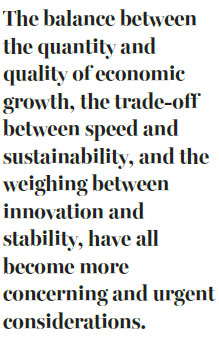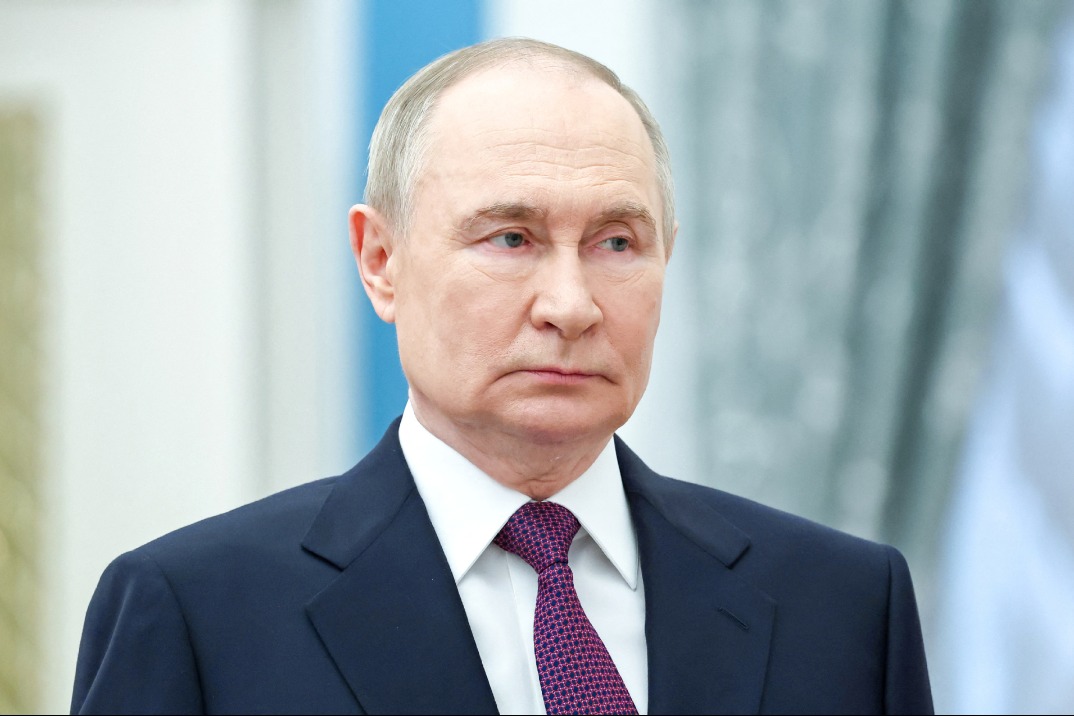Report sets fresh tones for development

Among the challenges that lie ahead will be how much of important mandate will be put into practice
The report delivered by Xi Jinping, general secretary of the Communist Party of China Central Committee, at the 19th CPC National Congress on Oct 18 has set some fresh tones for China's economic development in the coming decades. Somewhat different from targets set in some previous Party congress meetings, more inclusive objectives such as environment and soft power have been given more prominent positions and discussed at greater length.
Instead of mentioning a specific economic growth speed target or overall GDP numbers for the near future, the report puts more emphasis on the longer-term, more inclusive objectives of economic development.
By dividing the next three decades into two distinct developmental periods, Xi's report sets different development goals for each period. This is not only realistic and relevant to each stage of economic growth, but also puts clearer priorities to the shorter-term goals in the near future.

Such a subtle shift in the targets and priorities is not only necessary, but also crucially timely. With China's economic miracle, it has rapidly risen into the upper middle-income stage of growth. As China has become increasingly powerful around the globe in more than one area, its domestic economic situation becomes every more complex and delicate at the very same time. The balance between the quantity and quality of economic growth, the trade-off between speed and sustainability, and the weighing between innovation and stability, have all become more concerning and urgent considerations.
Probably targeted at answering such important questions, the report puts the new "development theory"' (the title for key section 5) and supply-side structural reform in a highly important place. The emphasis on such new theory and the new guideline itself conveys some important messages about how many things have to change going forward. It is important to keep in mind that much of the imbalance and unsustainability that China's economy currently faces is indeed consequence of economic policies that used to be highly successful and effective during the previous decades. Hence, a gradual yet fundamental change in ideas, theory and mentality is of paramount importance and urgency.
For example, recent policies have been trying hard to direct financing toward the real economy, instead of pursuing speculative opportunities within the finance sector. It is worth noting, however, that many investment products, especially those related to the real estate sector and infrastructure investment, provide not only higher returns compared with the real economy, but also prevalent government guarantees that make such investments too good to pass up. Reforming the finance sector can address some such balances. However, the key to fundamentally changing the situation is to gradually switch the entire society's expectation of the future of the Chinese real estate sector.

This leads to another related and equally important topic of real estate. In the past two decades, real estate has not only shouldered an increasing share of the contribution to China's economic growth, but also proved to be the best investment opportunity and the fastest way of creating wealth. Such accomplishments, however, come at a price of deteriorating housing affordability and civilian satisfaction and increasing inequality in wealth distribution. As a result, only the mere GDP growth target cannot accurately assess the true costs and benefits of the further boom of China's real estate sector, and a host of monetary, fiscal and regulatory policies will have to change accordingly, which will in turn provide fresh opportunities to the real economy.
Similarly, the report again rightfully stressed the importance of financial stability and preventing systemic financial risks. China's financial system has grown tremendously during the past three decades, along with the real economy. The nature of China's transitional economy, the gradual opening up of China's financial system, and the lack of experience of economic slowdown or crisis, all make it difficult to use extant knowledge in handling China's unique situation. The report has made it clear that, even though the available path and policy tools may be debatable, it is not an option to ignore the imbalance and distortion forever, and the new development theory has to take such risks seriously.
In sum, the report has touched upon almost all the important topics in keeping China's economic growth sustainable for the coming three decades and highlighted the importance of change in many key strategic areas. What remains to be seen is how much of such an important mandate eventually gets put into practice. After all, the devil is always in the details, and China is probably no exception in this regard.
The author is Oceanwide professor of finance at Tsinghua University. The views do not necessarily reflect those of China Daily.
(China Daily Africa Weekly 10/20/2017 page10)
Today's Top News
- EU has much to learn from China-Global South ties
- Xi holds phone conversation with Merz
- Xi stresses high-quality cultural-ethical advancement
- Trump halts Harvard's intl student enrollment
- Xi's visit gives impetus to our work
- Financing support enhanced for micro, small companies






























